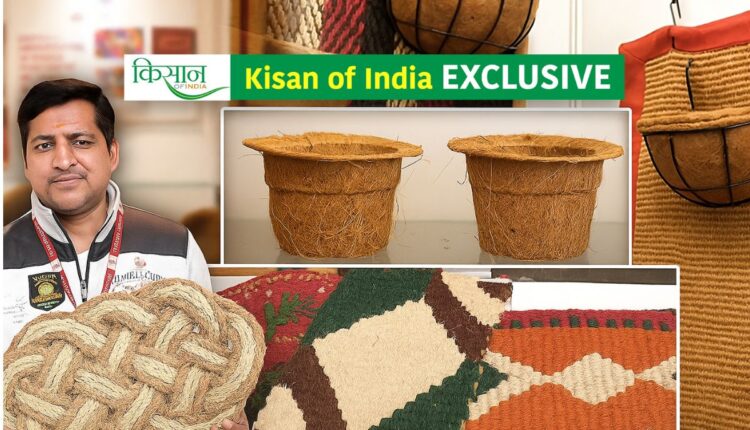Kerala’s Coconut Waste Turning into Eco-Friendly Decor and Livelihood Opportunities
In Kerala, coconut waste—often discarded as useless—is now being transformed into beautiful and eco-friendly décor products. Local artisans are using the discarded parts of coconuts to craft handmade baskets, doormats, planters, and many other items. This initiative is not only environmentally friendly but also a great source of employment for rural artisans. These products are perfect for enhancing home décor while protecting nature.
Remarkable Craftsmanship
The artisans of Kerala work not just with skill but with heart, which is why their creations are so appealing. With the support of the Kerala State Coir Corporation Limited (KSCCL), coconut waste is being given a new life. Vikram Mishra, associated with KSCCL, explains that the organization’s goal is to promote small artisans while ensuring sustainable use of waste materials, keeping the environment clean and green.
Protecting the Environment While Providing Employment
Kerala’s coastal regions produce large amounts of coconut waste, which artisans now use to earn their livelihood. With government support, these efforts have gained momentum, providing new employment opportunities while protecting the environment. From coconut husks, artisans make baskets, doormats, planters, and many other essentials.
Planters made from coconut shells mixed with rubber are especially beneficial—they absorb water well and help plants retain moisture during summer, preventing them from drying out. This way, waste is used productively while jobs are created for locals.
The Idea Born from Rising Pollution
According to Vikram Mishra, the push for eco-friendly products came in response to growing pollution levels, especially in cities like Delhi. To tackle this, artisans began producing garden articles and doormats from coconut husks and rubber. Some mats are machine-made, but handwoven mats remain highly valued for their durability and superior quality, even though they take more time and effort to produce.
A handmade mat, for example, requires about two hours of work—from extracting yarn from coconut fibers, converting it into rope, rolling it by machine, and finally weaving it into a mat.
Coco Peat: A Tonic for Plants
Apart from décor products, coconut waste is also being used to make coco peat, an excellent medium for plant growth. Lightweight and nutrient-rich, coco peat is especially beneficial for indoor and home gardening, as plants grow better in it compared to soil.
Vikram adds that coco peat planters work even in hilly regions, as they provide enough moisture with less water. Eco-friendly bird nests made from coconut waste are also being produced, encouraging more birds to visit balconies and gardens.
To support this initiative, the government is creating unique urban gardens, such as the vertical garden at Delhi’s Nizamuddin flyover. However, Vikram suggests that if coconut waste planters were used instead of plastic pots, the gardens would be more sustainable and water-efficient.
Employment for Lakhs of People
This eco-friendly initiative has already connected over 5 lakh people and more than 80 societies, where rural women and youth are engaged in making these products. Four manufacturing units have also been set up for machine-based production, and the products are now being exported both in India and abroad.
Thanks to technology and social media, demand is increasing rapidly. Products are even being supplied to major retail chains like Vishal Mega Mart. Vikram believes that greater access to local markets would further increase the benefits for artisans.
Affordable and Sustainable Products
Coconut waste products are not expensive, making them accessible to everyone.
- Doormats start at ₹200
- Planters at ₹50
- Coco peat at ₹30 per kg
Anyone wishing to start making handmade mats at home needs only raw coconut fibers, which are easily available in coconut-growing regions. Using crochet techniques, mats and other products can be crafted even at home.
Waste to Wealth in Kerala
The transformation of coconut waste into eco-friendly products in Kerala is not just about sustainability—it’s about livelihood too. This initiative has created income opportunities for artisans while giving consumers durable, eco-friendly alternatives. By turning waste into wealth, Kerala is setting an inspiring example of how craft, sustainability, and employment can go hand in hand.



